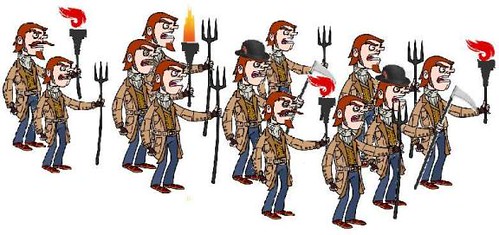By its many critics, social media has been called passing fad, the rule of the mob and even the Cult of the Amateur by writer and pundit Andrew Keen.
The latest volley came right before the Thanksgiving holiday from within social media circles by Chip Griffin on his weekly Media Bullseye Roundtable where he called social media “cult-like.”
(Correction: I mistakenly identified Drew McLellan as the person who called social media “cult like.” He did no such thing.)
Chip was referring to an incident chronicled on Chris Brogan's blog that concerned an employee of a Fortune 500 named “Bob” who continued to engage with customers online even after his boss (pointedly) told him to stop. His approach was decidedly evangelistic and subordinate – it was clear that Bob was a believer in social media.
And that makes me uncomfortable.
The Business of Communication
It's true that I use social media tools in my public relations practice, but I have been extremely reluctant to call myself a social media consultant – much less an evangelist.
In the end, I am a communicator, and I will use whatever tools are necessary to effectively communicate with those that matter most to my clients.
The truth is that social media tools ARE powerful and empowering. With them people feel as if they have a say in the outcomes of situations that were previously completely out of their reach. But realize that the power comes through the PEOPLE and not the tools themselves.
There are plenty of examples of how quickly a motivated crowd of people empowered by social media tools can change the course set by a company and force it to react. Even if the complaint is a hoax.
Just a Platform
An open, honest and authentic dialogue can OCCUR or start in a social media or networking platform, but these tools are merely the platform.
If I say I am an evangelist for social media, it is the same as saying that I am an evangelist for paper.
Why worship paper?
What is powerful are the words that are printed on the paper. Witness books like the Bible. Is the power of that book (whether you love or hate it) about books, or about the words and the community that rose up around the words written in that book?
So, Is It a Cult?
So back to the original question. Is social media a cult?
The short answer is no, unless you can call the printing press, radio or television a cult. However, a community could easily rise up within a social network that could be considered a cult.
cult (noun)
– an instance of great veneration of a person, ideal, or thing, esp. as manifested by a body of admirers: the physical fitness cult.
– a group or sect bound together by veneration of the same thing, person, ideal, etc.
Certainly, social media tools can lead some people to believe that they are much more popular than they actually are. And many have amassed a small, or even fairly large following online. There is nothing wrong with it, but as in all things, this attention can be used for the good or for self aggrandizing.
A few weeks ago when Geoff Livingston, author of the social media book “Now Is Gone” and owner of Livingston Communications, ranted against personal branding, he hit a nerve.
I am sure that some people have lost perspective, and possibly our friend “Bob” is one of them. While the web world is indeed influential, it is not an accurate representation of the real world.
My advice to communicators is to remember that the tools, while interesting and important, are never the ultimate goal. The ultimate goal is to be an effective communicator.
And yes, social media tools are a part of that mix.
What do you think?
And for those of you (like me) that can't help but to think of the music that might go with the moment, here is a little “Cult of Personality” performed by Living Color….

[…] is one of the reasons I am so uncomfortable with a focus on personal branding since it leads to an undue focus on the self rather than […]